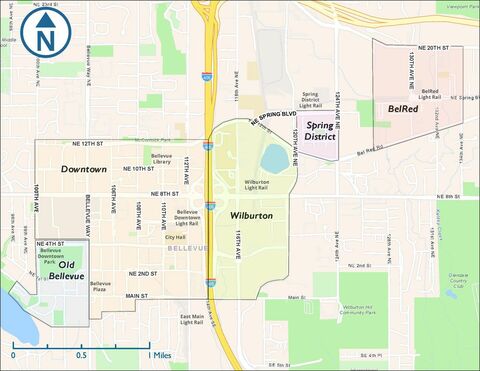The city is conducting a Curb Pricing Study that will explore the feasibility of charging for on-street parking in the Bellevue's urban core (downtown, BelRed and Wilburton neighborhoods). The study will use demand data, local and national best practices, detailed cost analysis and stakeholder feedback to help inform the next steps.
Why study curb pricing?
The Curb Pricing Study is identified as a high-priority, near-term action within the city's Curb Management Plan. Pricing curb space has been proven to effectively manage demand and increase access to on-street parking and loading zones for businesses and customers.
National best practices seek to price the curb so there are about one or two spaces available per block at any given time, allowing people to find parking more easily. Currently, Bellevue does not charge for on-street parking or curbside loading. Curb utilization data collected between 2022 and 2024 shows very high demand for on-street parking spaces, with many blocks completely full. Full street parking can cause people driving to circle the block multiple times, resulting in increased congestion and emissions. It also causes parking for commercial uses to spill into residential neighborhoods and delivery drivers to double park in the travel lane.
Although individual drivers may wish to have free parking, charging for curb space will allow for easier, more reliable access to shops, restaurants and other businesses in the Urban Core. It will also allow the city to better manage this important resource.
Background
The City Council adopted the Curb Management Plan in July 2023. The plan provides a long-range vision for better managing curbside areas - borders between streets and sidewalks - in Bellevue's densest neighborhoods.
During plan development, the project team worked with stakeholders and parking experts to develop best practice recommendations. A supply-and-demand philosophy was developed for curb usage, with pricing concepts recommended for future consideration. Launching a paid parking study was seen as a near-term priority in the curb management plan.
To learn more about the project, you can watch the recording of our online open house that happened on Feb. 10, 2025.
Project timeline
The Curb Pricing Study began in late 2024 and is expected to run throughout 2025. The Transportation Commission will work to provide a final recommendation to council on whether to implement curb pricing in the fall of 2025. The Transportation Commission will also provide recommendations on the approach to pricing.
How to get Involved
The Transportation Commission will be reviewing study findings and informing next steps during upcoming meetings. Members of the public are invited to attend and provide feedback.
Frequently asked questions
Why is Bellevue exploring curb pricing now?
As discussed in the CMP, on-street parking areas have been overwhelmed with demand, oftentimes being completely full on most blocks in Downtown, Old Bellevue and the Spring District. Charging for parking, loading and other related curb uses will help manage this demand, allowing for more frequent curbside parking availability.
How will prices be established?
The project team is reviewing existing data, such as average parking rates for off-street areas in Downtown and BelRed, to help inform decisions. Any curb pricing system will be performance-based, with prices adjusting on a regular basis.
What does Performance-Based mean?
Like other goods and services, curb usage exists in a supply-and-demand framework. There is a limited amount of curb space which must be managed based on demand. A performance-based system will review curb occupancy data on a regular basis and adjust prices higher or lower based on utilization. For example, if a block is shown to be mostly empty during a study period, prices would drop to meet lower demand. If a block is still mostly full, prices would rise. The goal would be to establish prices that allow for at least one or two open curbside parking spaces on any given block. The frequency of price changes will be determined during the study. For example, Seattle currently updates parking prices several times per year, while other cities like Denver aim to update prices annually.
How will curb pricing improve my parking experience?
Circling for parking or curb access is a frustrating experience, causing safety, congestion and environmental issues. Adding pricing will help increase curb access so it is easier to find at least one or two open parking spaces on a block at any given time. Space for delivery drivers will also be more readily available, reducing double parking that blocks the travel lanes.
How will funds from curb pricing be used?
As indicated in the CMP, funds may be used to increase enforcement resources and advance other priority initiatives identified in the CMP. Enforcement would focus both on parking violations as well as other traffic safety issues, such as double parking, travel lane blockages and bike lane blockages.
How will people be able to pay for on-street parking?
Details on hardware equipment and payment applications will be explored during the study. Many cities use a combination of pay stations and mobile payment services today.
Materials
- Transportation Commission (March 13, 2025): Agenda memo,
- Existing Conditions Report (February 2025)
- Virtual Open House Q&A Summary (February 10, 2025)
- Transportation Commission (December 12, 2024): Agenda item

